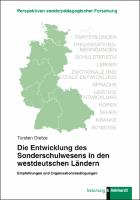Die Entwicklung des Sonderschulwesens in den westdeutschen Ländern
Empfehlungen und Organisationsbedingungen
Abstract
In the school year 2017/18, about 317,000 students with ascertained “special educational needs” have been taught in “special schools” (german: “Sonderschule” or “Förderschule”) in Germany. These special schools are still the place of study for about 6 of 10 of all students with special educational needs. Despite these high numbers of students, the actual organizational conditions at the special schools are hardly in the focus of special pedagogical research.
The content of this thesis, therefore, is to elaborate on the development of the special education system with regard to its real organizational conditions in the light of national educational policy recommendations (Western Germany). On the one hand the database consists of publications by national actors in the school system, in particular the KMK (Standing Conference of the Ministers of Education and Cultural Affairs of the Länder) and the special education association VDS (today’s name: Verband Sonderpädagogik e.V.), and on the other hand it consists of the official school statistics data of the Federal Statistical Office and the statistical offices of the Länder as well as the statistics on special education of the KMK. The educational policy recommendations are being compared to the real development. This is done for each defined individual main area of support.
Thus, special-purpose research is added to the existing pedagogic research. The research is supplemented by further analyses, such as the proportion of boarding schools or the importance of private schools. Finally, extensions to the statistical database will be developed in order to more specifically illustrate the learning conditions at special schools. Further, reference is also made to statistical needs for the future mapping of the inclusive special educational support. Im Schuljahr 2017/18 wurden in Deutschland rund 317.000 Schülerinnen und Schüler in Förderschulen (Sonderschulen) unterrichtet. Die Förderschule stellt damit für rund 60% der Schülerschaft mit einem festgestellten sonderpädagogischen Förderbedarf den zu besuchenden Unterrichtsort dar. Trotz dieser hohen Zahlen an Förderschülern stehen die realen Organisationsbedingungen an den Förderschulen jedoch kaum im Blickfeld sonderpädagogischer Forschung.
Inhalt dieser Arbeit ist es daher, differenziert nach sonderpädagogischen Förderschwerpunkten die Entwicklung des Förderschulwesens hinsichtlich seiner realen Organisationsbedingungen vor dem Hintergrund nationaler bildungspolitischer Empfehlungen aufzuarbeiten. Die Datengrundlage bilden hierzu auf der einen Seite Veröffentlichungen nationaler Akteure im Schulwesen wie insbesondere der KMK und des Sonderschulverbandes VDS (heute: Verband Sonderpädagogik e.V.) sowie auf der anderen Seite die amtlichen Daten der Schulstatistik des Bundes und der Länder sowie die KMK-Statistik zum Sonderschulwesen. Die bildungspolitischen Empfehlungen werden mit der realen Entwicklung in den einzelnen Förderschwerpunkten verglichen. Damit wird der sonderpädagogischen Forschung eine datenorientierte Untersuchung der Entwicklung des Förderschulwesens hinzugefügt, die ergänzt wird durch weitere Analysen wie den Anteil an Heimschulen oder die Bedeutung der Privatschulen. Abschließend werden Erweiterungen der statistischen Datenbasis erarbeitet, um die Organisationsbedingungen an Förderschulen konkreter abzubilden. Es wird darüber hinaus auch auf statistische Bedarfe zur zukünftigen Abbildung der inklusiven sonderpädagogischen Förderung verwiesen.
Keywords
Sonderpädagogik; Sonderschulwesen; Schulentwicklung; Sonderschule; Schulorganisation; Empfehlung; Bildungspolitik; Sonderpädagogische Förderung; Förderung; Zeitgeschichte; Bundesland; Nationaler Vergleich; Geschichte <Histor>; Integrationsklasse; Förderschwerpunkt; Lernbehinderung; Volksschule; Sprachbehinderung; Soziale Entwicklung; Geistige Behinderung; Körperbehinderung; Motorische Entwicklung; Hörbehinderung; Sehbehinderung; Krankes Kind; Schulrecht; Statistik; Bildungsstatistik; Statistische Analyse; 18. Jahrhundert; 19. Jahrhundert; 20. Jahrhundert; Deutschland <bis 1945>; Deutschland-BRD; Deutschland-Westliche Länder; Hilfsschule; Historischer Überblick; Deutschland-Westzonen; Remedial instruction sciences; Special education for the handicapped; Special needs education; Separate special education; Special education; Special needs schools; School development; School for the handicapped; Special needs school; Special school; School organisation; School organization; Educational policy; Contemporary history; Twentieth century history; History; Inclusion class; Integration classes; Learning handicap; Elementary School; General compulsory school; Primary school; Language Handicaps; Speech disability; Speech disorder; Speech handicap; Speech Handicaps; Speech impairment; Social change; Social development; Oligophrenia; Physical handicap; Motor development; Aural handicap; Hearing impairment; Visual handicap; Law concerning schools; School law; Statistics; Education statistics; Educational statistics; Statistical analysis; Germany-FRG; Germany-Western States; Emotions; GermanyDOI
10.35468/5736ISBN
9783781557369, 9783781523012Publisher
Verlag Julius KlinkhardtPublication date and place
Bad Heilbrunn, 2019Grantor
Series
Perspektiven sonderpädagogischer Forschung,Classification
History of education
Teaching of students with different educational needs


 Download
Download Web Shop
Web Shop